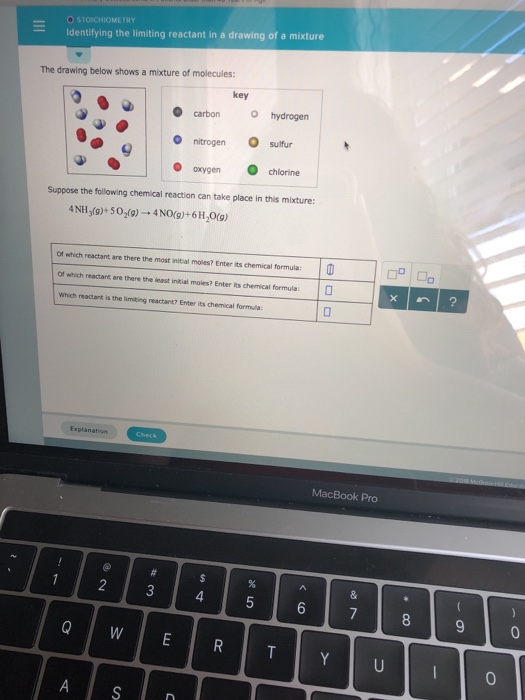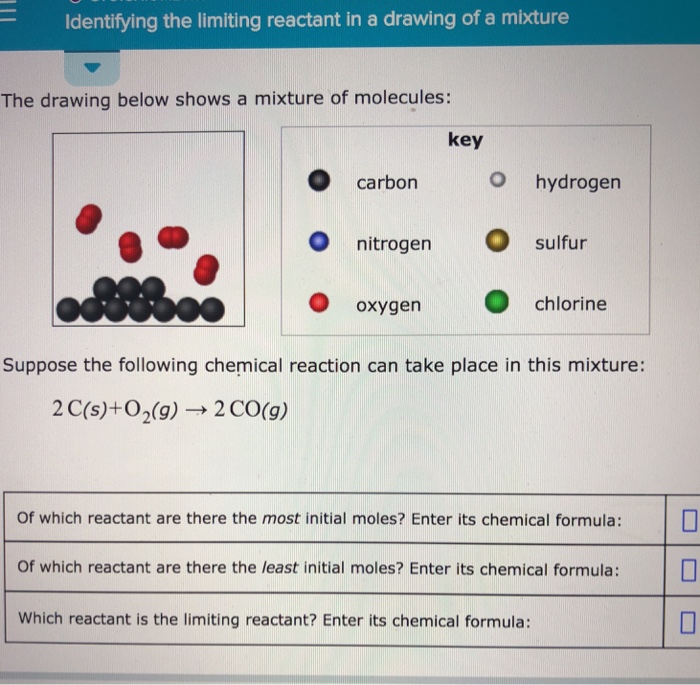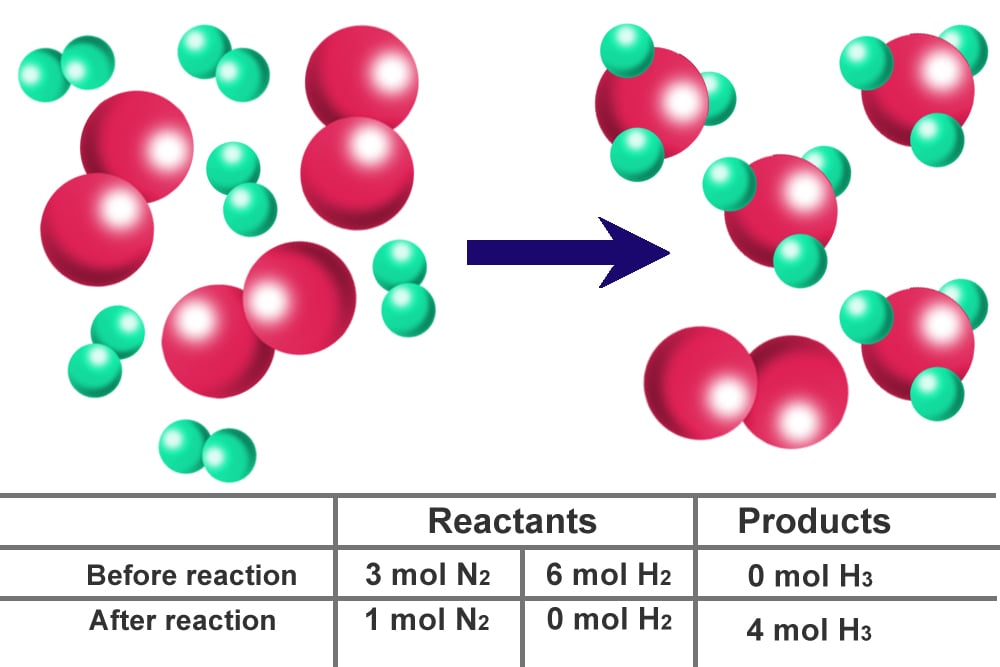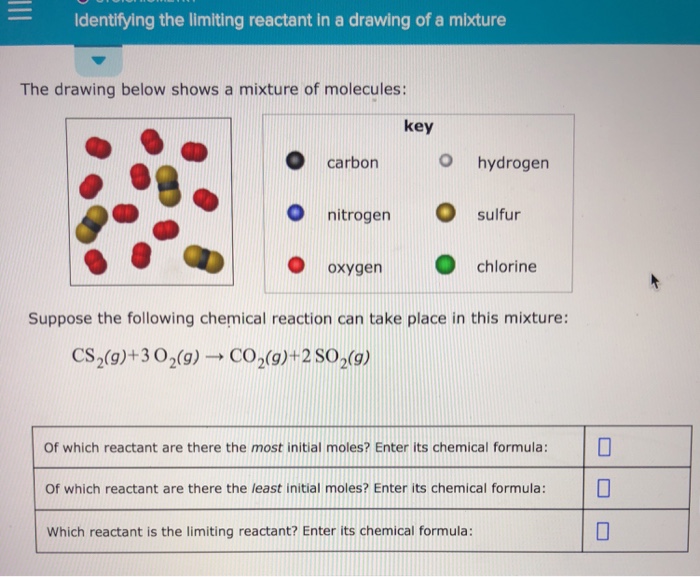Identifying The Limiting Reactant In A Drawing Of A Mixture
Identifying The Limiting Reactant In A Drawing Of A Mixture - What we need to do is determine an amount of one product (either moles or mass) assuming all of each reactant reacts. Web identifying the limiting reactant in a mixture of molecules: O sulfur chlorine suppose the following chemical reaction can take place in this mixture: H2 of which reactant are there the least initial moles? Web enter its chemical formula:
To identify the limiting reactant, calculate the number of moles of each reactant present and compare this ratio to the mole ratio of the reactants in the balanced chemical equation. H2 of which reactant are there the least initial moles? Key o hydrogen carbon sulfur o nitrogen chlorine oxygen suppose the following chemical reaction can take place in this mixture: Key o carbon hydrogen sulfur nitrogen oxygen chlorine suppose the following chemical reaction can take place in this mixture: Look at the balanced reaction and determine how many of each particle is required. O 0 carbon nitrogen oxygen key o hydrogen. Web about press copyright contact us creators advertise developers terms privacy policy & safety how youtube works test new features nfl sunday ticket press copyright.
(Get Answer) STOICHIOMETRY ? Identifying The Limiting Reactant In A
Web = o chemical reactions identifying the limiting reactant in a drawing of a mixture the drawing below shows a mixture of molecules: To identify the limiting reactant, calculate the number of moles of each reactant present and compare this ratio to the mole ratio of the reactants in the balanced chemical equation. \begin{tabular}{ll} \hline.
Solved O STOICHIOMETRY Identifying The Limiting Reactant
Web as we saw in example 1, there are many different ways to determine the limiting reactant, but they all involve using mole ratios from the balanced chemical equation. Web identify the limiting reactant(s) and excess reactant(s). To identify the limiting reactant, calculate the number of moles of each reactant present and compare this ratio.
(Solved) Identifying The Limiting Reactant In A Drawing Of A Mixture
Stoichiometry identifying the limiting reactant in a drawing of a mixture the drawing below shows a mixture of molecules: Stoichiometry 一 identifying the limiting reactant in a drawing of a mixture the drawing below shows a mixture of molecules key o carbon o hydrogen o nitrogen sulfur o oxygenchlorine suppose the following chemical reaction can.
5.3b Identifying the limiting reactant in a drawing of a mixture YouTube
You'll get a detailed solution from a subject matter expert that helps you learn core concepts. O sulfur chlorine suppose the following chemical reaction can take place in this mixture: Ch (9)+20,(9) + co2(9)+2h 0(0) of which reactant are there the most initial moles? Count the number of particles in the drawing given. H2 of.
How to Identify the Limiting Reactant in a Drawing of a Mixture
Determine the limiting reactant for the reaction 2 h 2 + o 2 → 2 h 2 o based on the diagram below of the reactant mixture: Web identifying the limiting reactant in a mixture of molecules: Web identify the limiting reactant(s) and excess reactant(s). Key o hydrogen carbon sulfur o nitrogen chlorine oxygen suppose.
How To Find The Limiting Reactant In A Chemical Reaction?
The amount of product that can be formed based on the limiting reactant is called the theoretical yield. How to solve a tricky version of the aleks “limiting reactant” problem. Key o hydrogen carbon sulfur o nitrogen chlorine oxygen suppose the following chemical reaction can take place in this mixture: 4 this problem has been.
(Solved) Identifying The Limiting Reactant In A Drawing Of A Mixture
The amount of product that can be formed based on the limiting reactant is called the theoretical yield. The excess reactant is mgcl 2 since its complete reaction would have yielded up to 0.878 g mg. To identify the limiting reactant, calculate the number of moles of each reactant present and compare this ratio to.
ALEKS Identifying the Limiting Reactant in a Drawing of a Mixture
In the real world, amounts of reactants and products are typically measured by mass or by volume. Web identifying the limiting reactant in a mixture of molecules: Stoichiometry identifying the limiting reactant in a drawing of a mixture the drawing below shows a mixture of molecules: Count the number of particles in the drawing given..
ALEKS Identifying the Limiting Reactant in a Drawing of a Mixture
\begin{tabular}{ll} \hline key & hydrogen \\ nitrogen & sulfur \\ oxygen & chlorine \\ \hline \end{tabular} suppose the following chemical reaction can take place in this mixture: Web how to identify the limiting reactant (limiting reagent) example \(\pageindex{1}\): Suppose the following chemical reaction can take place in this mixture: Web identifying the limiting reactant in.
Aleks Identifying the limiting reactant in a drawing of a mixture YouTube
Your answer is incorrect the drawing below shows a mixture of molecules: Web the reactant that is consumed first and limits the amount of product(s) that can be obtained is the limiting reactant. Calculate the mass of excess reactant that reacts. Cs₂(g)+30₂(g) → co₂(g) +2 so₂(g) of which reactant are there the most initial. Which.
Identifying The Limiting Reactant In A Drawing Of A Mixture Convert all given information into moles. How to solve a tricky version of the aleks “limiting reactant” problem. Web identify the limiting reactant(s) and excess reactant(s). Web about press copyright contact us creators advertise developers terms privacy policy & safety how youtube works test new features nfl sunday ticket press copyright. To identify the limiting reactant, calculate the number of moles of each reactant present and compare this ratio to the mole ratio of the reactants in the balanced chemical equation.
Web The Reactant That Is Consumed First And Limits The Amount Of Product(S) That Can Be Obtained Is The Limiting Reactant.
Web identifying the limiting reactant in a mixture of molecules: 2c2h2 (g)+so2 (g)_+4co2 (9) + 2h2og) of which reactant are there. Stoichiometry identifying the limiting reactant in a drawing of a mixture the drawing below shows a mixture of molecules: Your answer is incorrect the drawing below shows a mixture of molecules:
What We Need To Do Is Determine An Amount Of One Product (Either Moles Or Mass) Assuming All Of Each Reactant Reacts.
The amount of product that can be formed based on the limiting reactant is called the theoretical yield. Web about press copyright contact us creators advertise developers terms privacy policy & safety how youtube works test new features nfl sunday ticket press copyright. Web determining the limiting reactant. Web high school chemistry skills practice 1.
Web The Reactant That Is Consumed First And Limits The Amount Of Product(S) That Can Be Obtained Is The Limiting Reactant.
O sulfur chlorine suppose the following chemical reaction can take place in this mixture: Web try it free. Determine which substance will run. Web = o chemical reactions identifying the limiting reactant in a drawing of a mixture the drawing below shows a mixture of molecules:
The Excess Reactant Is Mgcl 2 Since Its Complete Reaction Would Have Yielded Up To 0.878 G Mg.
Whichever reactant gives the lesser amount of product is the limiting reagent. Web how to identify the limiting reactant (limiting reagent) example \(\pageindex{1}\): \begin{tabular}{ll} \hline key & hydrogen \\ nitrogen & sulfur \\ oxygen & chlorine \\ \hline \end{tabular} suppose the following chemical reaction can take place in this mixture: It is first necessary to convert the given quantities of each reactant to moles in order to identify the limiting reactant.









